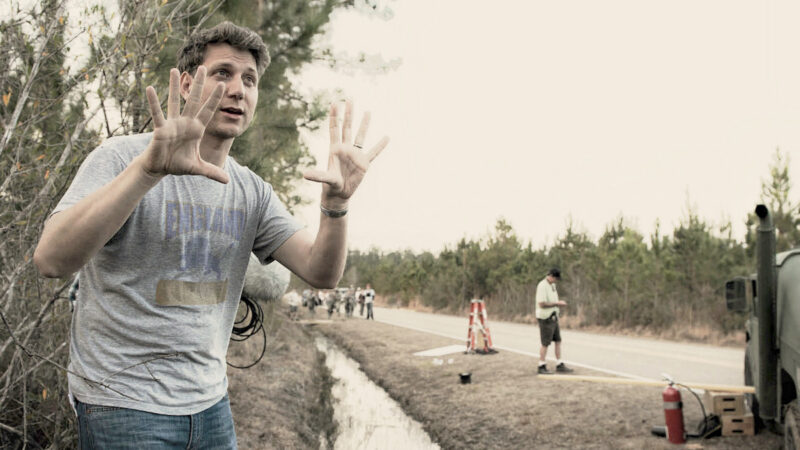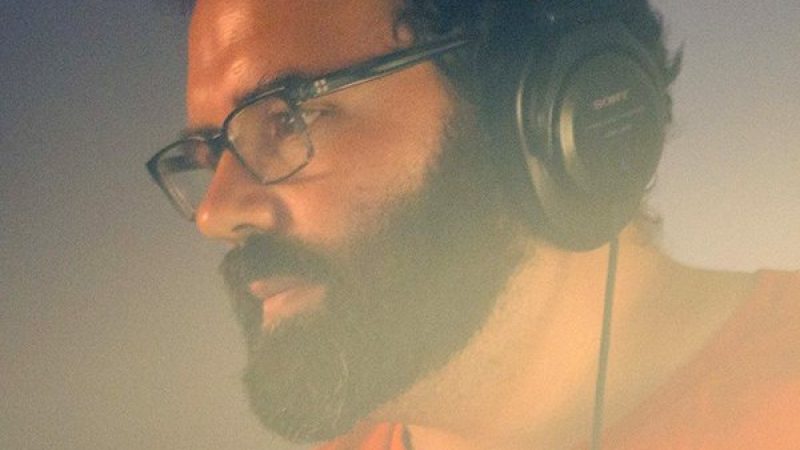SAG-AFTRA & Creator of Dramatic Series “Blackout Drunk” on her work & process
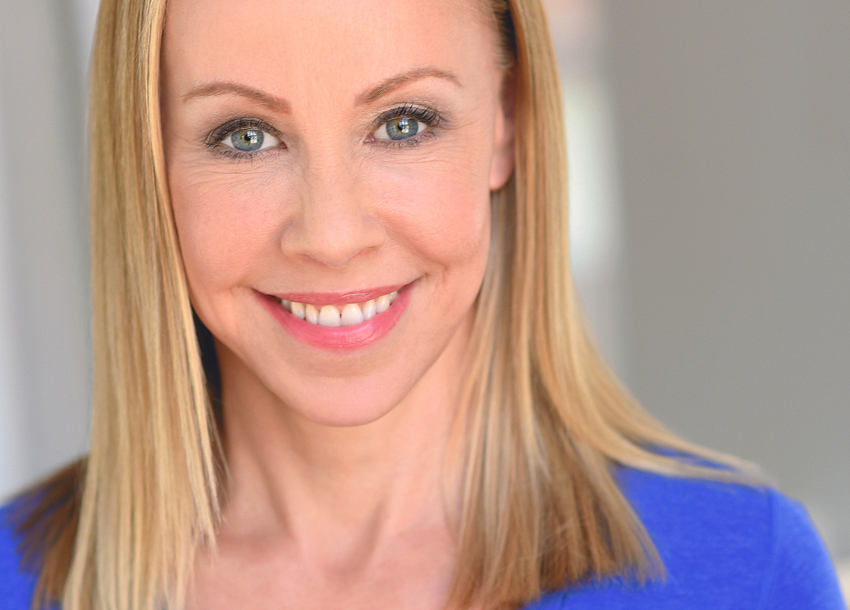
I’m the oldest of four girls and we grew up in New Jersey. I was a skinny little thing with a bossy personality and I used that to cast myself as the lead in my homemade productions where my sister’s would be the supporting cast. When it came time for college I told my parents that I wanted to study Acting, and they said, “NO”.
I found their response quite difficult to bear. So I studied Business to pacify them. It was horrible. I hated it and spent the next four years partying way too much. After college I still had that deep desire to act. This was in the early 90’s and there was no internet or Google so I had to figure everything out the hard way. I made every mistake you could possibly think of.
I sent out my head-shot and resume without cutting my resume to fit my picture, I paid people to put my picture in their “look book” for casting people, I was literally chased around the desk of an agent. I went on auditions that were clearly not for my type. Then I met a manager who told me to get involved in a theatre company. I thought, “Well how do I do that?”
“Backstage” gave me some direction and I auditioned for a production and I was accepted. It was called, “Lovecreek Productions”. I was thrilled! The requirements were that you had to sign up for some aspect of work and attend every main stage show. They signed me up for set construction. I had never done that before. When they cast me in my first short play I was ecstatic. I loved everything about it. The rehearsal, the work, the performance. I was the happiest I’ve ever been.
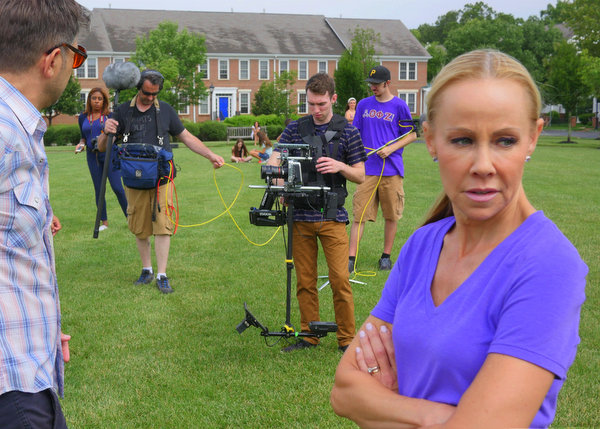
During my 10 years there I started writing my own short plays and even one full length. I helped produce my full length and starred in it. It was called, “One Slow Day at the Go-Go Bar.” We played to three sold out houses. During that time I had also met some people and became part of a comedy troupe called, “Video Bandits”. We wrote and performed sketch comedy for cable. One of the other members cast me as the lead in his feature film,” A Clown in Babylon”.
That experience was amazing. We worked long hours but I didn’t care because I loved it so much. After 10 years I left acting to start a family. I got pregnant and we had a son named Jake. When Jake was getting older my former colleague reached out to me with his new script. He cast me as the lead for, “Paradise East”. I started to go to some local film festivals and as I was watching the short films I had this feeling that I could do that. I could write a story for the screen.
There was a lot of push back from the negative part of my brain. A lot. Those thoughts are always in there. I’ve come to learn that if you think about doing something, I mean if you really keep thinking about it, then you are supposed to do that thing.
We must push past that negative thought. We all have them. All of us creatives have that part of us that tries to criticize. That does criticize! It’s there. But we cannot let that voice stop us. So I wrote my first short film, “Acceptance”. It’s based on a true story.
When my son was seven, he was diagnosed with Asperger’s Syndrome. IT’s considered to be high function autism. “Acceptance” is the story of a mother struggling with her son’s autism diagnosis. I rallied people together to help me make this film. I found people locally.
I recruited people from my Spinning class. I was teaching indoor cycling and one of my member’s told me her husband had gone to film school to direct.
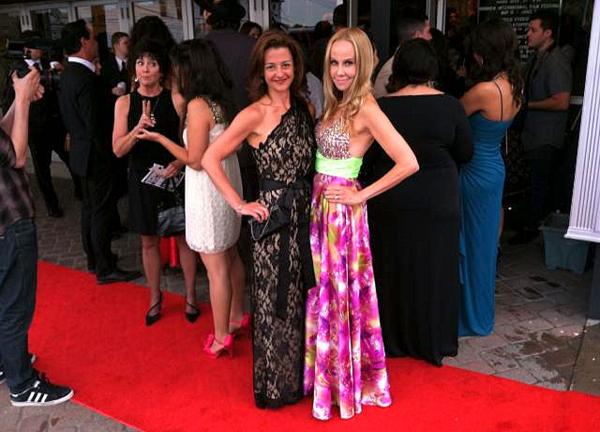
He was working full time at “Good Morning America” as a technical person. I asked her if she would give him my script and she said, “Yes”. I was terrified. What if he hated it? What if it would ruin our friendship? I waited a few days and I heard nothing. I was feeling defeated. I called her and asked if he had read it yet.
She called out to him and I heard him say, “I’, reading it now”. I asked her if I could stop by. I did. I walked over to the dining room table where he was sitting and my heart was pounding. I sat down and he looked at me and he said, “I love this story”.
That was the beginning of me producing my first short film. I was relentless in pursuing people to be on our crew. That was October 2011. We started shooting Dec. 2011. I didn’t waste any time. On the first day of shooting I had 20 people in my home. I had a full crew and an amazing DP and sound person. It was fantastic. It’s so worth facing all those fears to get to what you really want. After we shot it and edited it, I started sending it out to festivals. I was so naive.
Now as I look back, I can see how much I have learned. I would tell new filmmakers to save their money and not to submit to the big festivals. Submit to local ones so you can meet people who you can collaborate with. If you really want to try for the big ones, send an email with a link to your film to the programmer. Ask them for a waiver. If they say, “No” they don’t want your film. You’ll save yourself a lot of money. Most of the big festivals actually recruit their films. If they want your film they will give you the waiver.
Q: Did you study what you do?
Laura Shapanus: I studied acting. I still study Acting. I spent the last year at HB Studio taking Scene Study classes. Now I am currently enrolled at UCB (Upright Citizens Brigade) Improv 101. I also take private scene study classes with Jeff Seymour author of, “The Real Life Actor”. When I was making my film I surrounded myself with wonderful people who were great at what they did. I knew enough to put together a team of professionals. And then I trusted their work.
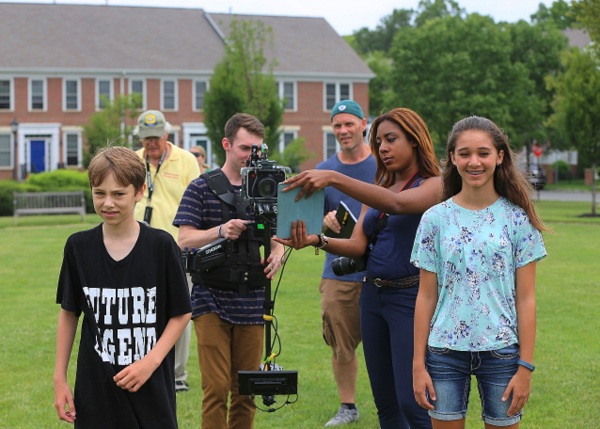
Q: What is your filmmaking process?
Laura Shapanus: It took me a long time to find a technique that really resonated with me. I always felt that a lot of the techniques out there create a feeling of “not doing enough” and then it affected my confidence as an actor. For example, the idea of creating an entire backstory- how far back should I have gone? Is it enough? Then I felt it hindered my ability to be present because I was always doubting myself.
I found this great book- “The Real Life Actor”. His approach is based on how we behave in real life. I was instantly intrigued. This was the technique I had been searching for. I’ve never felt this level of confidence in my work before. I am so grateful that Jeff has created this way of working. It makes so much sense to me.
Q: Tell us about the work you have produced?
Laura Shapanus: I’ve learned so much through the years about acting. I learned it’s not reciting lines with feeling. It’s not just about memorizing words on a page. It’s about honoring the story. In a truthful, real, honest way. My short films are based on real things that happened to me. Events that changed me as a human being.
Telling our stories can heal people. It brings us together and lets us know that we are not alone. When I first found out my son had autism, I was devastated. I never thought I would produce a film about that moment. It was years later that I wrote the story. So many people have reached out to me to say how much my film has meant to them. How I was telling their story. I was telling their story because I lived it. It’s important to honour the work.
Q: How do you combine acting, producing and writing?
Laura Shapanus: I’ve read “The Writer’s Journey” by Christopher Vogler- and many other books on writing and acting. I’m always reading something to better my mind. ‘The Artist’s Way” Julia Cameron is a must read for any creative person.
Q: How Did You Get Into The Film Business?
Laura Shapanus: Hard work and perseverance. I kept showing up to the next thing. I would go on many auditions, and I finally got hired to be in a film. It’s a constant thing. It’s always going to be that way. If I can’t get a part I will create one. We need to tell our stories as women. Especially women over 40. We have a different perspective and it can only come from us.

Q: How do you turn an idea into a screenplay?
Laura Shapanus: It has to be a story you must tell. You must feel passionate about it. Because there will be so many times that you want to quit. If you are passionate about telling the story it will get you through those moments. Then you just have to sit down and start writing. It’s just about doing the work. It will be lonely and difficult at times. But then there are those moments where the story is writing itself. That’s magical.
Q: Explain your writing process?
Laura Shapanus: I get an idea in my head and then I see if it will go away or stick around. Then I will start seeing images in my mind. I see the story. Once I start writing my characters seem to have a life of their own. They start taking over. I send my pages to my director and he gives me notes in a very positive way. Then I rewrite. And do the same thing. I continue until he says,”this is it”. It’s frustrating because I’m very impatient. But every time I do rewrites, my story improves.
Q: What writing tip or ideas can you give writers?
Laura Shapanus: Keep writing. Read, “The Artist’s Way”. Immediately! That book is amazing!
Q: What is it like working in the Hollywood System?
Laura Shapanus: I’m more of an Indie filmmaker so I cannot comment on that.
Q: What do you want to change about the film business?
Laura Shapanus: The idea that women have to be young and perfect. Our imperfections make us human. They make us interesting.Women over 40 are beautiful and interesting too! We don’t treat them that way. That needs to change.
Q: What do you want to be remembered for?
Laura Shapanus: Being a strong woman who encouraged others and made people feel good about themselves. I want people to remember that even though I was afraid I did what I wanted to do, and they should too. Life goes by so fast- we have these dreams because we are meant to follow them.
I’ve never dreamed of playing the piano. Because that’s not me. I’ve always dreamed of being an actor. Of being a storyteller. Always. It feels wonderful to say it and own it. So many people are afraid to admit what their dreams are. I was. But then I got tired of pretending, and pushing it down. It’s always there.
Follow the actor on Social Media
Website
IMDb
Facebook
Twitter
Instagram
Actor Access
The Key Facts Behind How Jeff Nichols Made The Indie Hit MUD
Jeff Nichols gives himself directorial challenges to master on every project.
In Conversation with Michael Oblowitz Director of Confidential Informant
Confidential Informant stars Mel Gibson, Dominic Purcell, and Kate Bosworth

